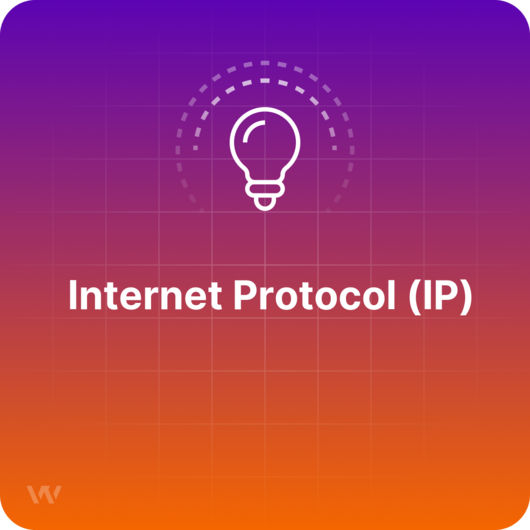Internet Protocol (IP)

TL;DR
An IP address is a unique online identifier for each device connected to the Internet, and it helps to track the device's location and network.
What is an IP?
"IP" is the acronym for "Internet Protocol" and the "address" refers to the unique number assigned to each device that uses the Internet Protocol for communication.
There are two types of IPs:
- static IPs
- dynamic IPs.
Having a Static IP means your IP addresses won't change and you will have the same IP every day if you connect to the same network.
What is the role of IP Tracking?
The role of an IP address is for network interface identification and for geolocation services to accurately estimate where you are.
Static IPs are an option for businesses usually because they are very useful for dedicated services (e.g., web servers or FTP, hosting computer servers).
Note that network addresses are designed to be unique identifiers across the network, although some networks allow for local, private addresses or locally administered addresses that may not be unique.
Why is IP anonymization important?
IP anonymization is a feature that prevents the storage of an IP address, and it was designed to help all website owners comply with legal regulations such as GDPR, their own privacy policies, and local data protection rules.
According to REGULATION (EU) 2016/679 OF THE EUROPEAN PARLIAMENT AND OF THE COUNCIL on the protection of natural persons with regard to the processing of personal data and on the free movement of such data, and repealing Directive 95/46/EC (General Data Protection Regulation) there are a few simple rules to consider:
- The protection of natural persons in relation to the processing of personal data is a fundamental right.
- Everyone has the right to the protection of personal data concerning themselves.
- The principles of, and rules on the protection of natural persons with regard to the processing of their personal data should, whatever their nationality or residence, respect their fundamental rights and freedoms, in particular, their right to the protection of personal data.
This is a piece of important key information, as an IP Address falls under personal data, according to Article 4
(1) 'personal data' means any information relating to an identified or identifiable natural person ('data subject'); an identifiable natural person is one who can be identified, directly or indirectly, in particular by reference to an identifier such as a name, an identification number, location data, an online identifier or to one or more factors specific to the physical, physiological, genetic, mental, economic, cultural or social identity of that natural person;
and anonymization or pseudonymization refers to the following:
(5) 'pseudonymisation' means the processing of personal data in such a manner that the personal data can no longer be attributed to a specific data subject without the use of additional information, provided that such additional information is kept separately and is subject to technical and organizational measures to ensure that the personal data are not attributed to an identified or identifiable natural person;
Here's a step-by-step guide to anonymize all your visitors' IPs in the app:
- Log in to your aoo account and select your Website
- Go to Website Settings
- Set the Anonymize my Visitors IPs ON and click Save
Once you set the anonymization option on, none of your visitors' IPs will be stored.
Note: By selecting IP anonymization, you will never see any IP addresses. We are not tracking your visitors via the IP address, and it will not affect your data at all.

